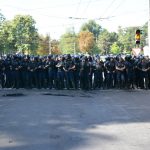Not In My Back Yard – Residents Protest Against Youth Detention Centre

Thousands of residents have protested in Melbourne’s west against the Victorian government’s proposal to build a new youth detention centre at Werribee South.
The protest
Members of the public were previously encouraged to send an email every day to Premier Daniel Andrews and his senior Cabinet to protest the decision. “The more emails we send … the more they’re going to listen,” former Wyndham City councilor Glenn Goodfellow told the crowd.
The local community is concerned the project will undermine efforts to build the region’s tourism industry. Federal Labor MP Joanne Ryan told the crowd that “as a community we have worked too hard for too long to undo the stigmatisation of this community … to have it undone by one decision.”
Mayor Henry Barlow explained that the plan would jeopardise the involvement of a Chinese consortium interested in the region. “The precinct is our pocket of promise” he said, adding that the proposed site is visible from the road to Geelong.
Youth justice centre
The proposal to build the centre comes after a damning independent report into the Parkville facility called for a new, improved youth justice centre.
The review found that Parkville was unsuitable for its intended purpose, posing unacceptable risk to staff and young inmates.
“The Comrie report, which provides a very damning commentary on the state of Parkville, talks about the fact that if a facility is not secure, then no rehabilitation, no effective programs can be run in that facility,” Mr Andrews said.
Strategic decision
Local member and State Treasurer Tim Pallas says Werribee is the “preferred” location because it meets the required criteria.
“It needs proximity to transport, health, education and community services,” he said.
“It needs a significant buffer from any residential areas, it needs 30 hectares of land, it needs accessibility for staff, the projected needs of youth justice services. If there are alternatives, they would actually have to stack up against that site selection criteria.”
Living next to a prison
While Werribee residents are resolutely protesting, a recent report into the experience of the Victorian town of Ararat suggests that living next to a correctional facility is not that bad.
Mother of four, Kristal Clarke, lives near the medium security prison and is unperturbed by offenders being nearby. “There’s never been a concern really. We’ve had people come telling us they’d notify us immediately if anyone had escaped or anything, being so close, and that’s good enough for me to feel safe,” she remarked.
Another benefit is job creation, with the corrections industry becoming the biggest employer in Ararat. In addition to 325 employees staffing the prison around the clock, there are hundreds of contractors, cleaners, administrators, health workers and other workers involved with the Hopkins Correctional Centre.
“I think the jail’s been one of the best institutions that’s arrived here for employment,” said ex-mayor Jim Dunn. “The Ararat people have accepted it long ago. The benefit we derive out of it as a town makes it very worthwhile. And it doesn’t give us any trouble.”
NIMBY-ism
NIMBY (an acronym for the phrase “Not In My Back Yard“) is a pejorative characterisation of opposition by residents to a proposal for a new development because it is close to them, often carrying connotations that residents accept the developments are necessary but should be somewhere else.
Wyndham City Council last week unanimously voted not to support the proposal, which they say was sprung on council leaders “without consultation”.
“We are fully supportive of a new youth facility, [but it’s] is in the wrong place,” Mayor Barlow said. Fellow tractor protester Giovanni Todaro said: “Find another town. It’ll be a downer on the area.”
Ararat resident Merryl Woolley sees the protests in Werribee as a knee-jerk reaction rooted in a fear of the unknown. “You’re not going to be inundated by criminals,” she remarked. “You’ll be inundated by prison officers and their families.”
“It’s jobs. It’s all about the economy,” she added. “A lot of places wonder why rural towns die. Well if you protest against these types of industries coming to your area it’s gonna die.”






